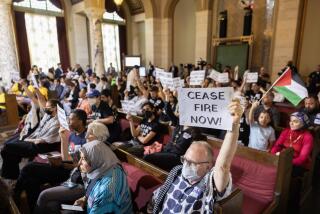Rampage Stirs Horror, but Also a Sense of Solidarity
- Share via
The news was abrupt and jolting. A man with a gun. Bloody havoc at a Jewish day-care center. Children hurt and crying. It shook the Rev. Cecil “Chip” Murray like an earthquake.
As pastor of the First African Methodist Episcopal Church in Los Angeles, Murray is in a special position to understand the fear and anger that must have flooded the senses of the Granada Hills residents in harm’s way.
In 1993, his church was the target of a bombing conspiracy by white supremacists, a plot that ultimately was thwarted by federal agents. To know human nature, said Murray, is to never get over the surprise at what some humans are capable of.
“I was blown out of the water,” he said Wednesday, remembering his initial reaction. “Again? Again? It was like an earth tremor. I know human nature, but like an earthquake, each human tremor has an identity of its own and keeps pointing toward the big one. You never get used to it.”
Like Murray, other civic leaders in Los Angeles expressed horror at Tuesday’s shootings--and fear that other communities might become targets of deranged hate mongers or copycats.
But there was also a grim sense of solidarity: that the city is capable of absorbing the latest mayhem and of moving forward.
“Now that we know the facts, we can talk about what this means, and it goes beyond the Jewish community,” said Joe Hicks, executive director of the Los Angeles Human Relations Commission. “In conversations I’ve had on the street, in elevators, there is a general outrage at the events that we all want to share in. What is critical is: Where do we go forward from here?”
Hicks and others said not enough effort has been made to teach children about tolerance for people who are different.
“It has often taken a kind of warm and fuzzy approach of ‘Let’s sing “Kumbayah” ’ and never a serious attempt nationally to look at how you engage young people and educate them,” he said.
Geraldine Washington, executive director of the Los Angeles NAACP chapter, agreed but said efforts must extend further than the schoolroom.
“Certainly education plays a part, but that must include adults,” she said. “Schools can only do so much. By the time children begin school they have already formed some basic attitudes.”
Disconnected and Marginalized People
But Hicks does not believe that Los Angeles or the nation for that matter, is besieged by an epidemic of hate.
“These are sporadic incidents,” he said. “We don’t pick up our paper reading about some horrific hate crime every day. These are disconnected, marginalized people that I think crawl from under rocks occasionally, act out horrendous acts to gain publicity for causes that I think are shrinking in public life.”
It is a view shared by Tamar Galatzan, an attorney at the Los Angeles Anti-Defamation League. What is problematic, though, is that the few that adhere to racist thought are often the most zealous.
“I do think fewer people are involved in these movements than a number of years ago,” said Galatzan. “But those left have realized that they are going to have to commit more violent acts to get the attention of America and the media. Those left are die-hards willing to die for their cause.”
As a result, the league is fielding scores of inquiries from individuals and institutions--both in the Jewish community and outside of it--concerned about their safety, she said.
The group is planning a community meeting Tuesday in the San Fernando Valley to offer information on security measures that schools, churches and other institutions can take.
African American leaders say they too are concerned and will ask the Los Angeles Board of Education to implement precautionary measures to protect schoolchildren.
Meanwhile, members of the Asian Pacific American community were trying to learn more about the killing of mail carrier Joe Ileto, whose death authorities now believe is linked to the Jewish community center shootings.
No one is yet sure if the slaying of Ileto-- a Filipino American from Chino Hills who was shot several times in the chest and head while delivering mail in Chatsworth-- was racially motivated.
“We’re concerned that this postal worker’s killing is linked to this hate crime spree,” said Stewart Kwoh, executive director of the Asian Pacific American Legal Center in Los Angeles.
He stressed that hate groups rarely limit their targets to one group.
“And that’s something important for all of us to realize. If people think it’s just happening to Jewish Americans or Asian Americans, then that’s really an incomplete response,” he said.
More to Read
Sign up for Essential California
The most important California stories and recommendations in your inbox every morning.
You may occasionally receive promotional content from the Los Angeles Times.











